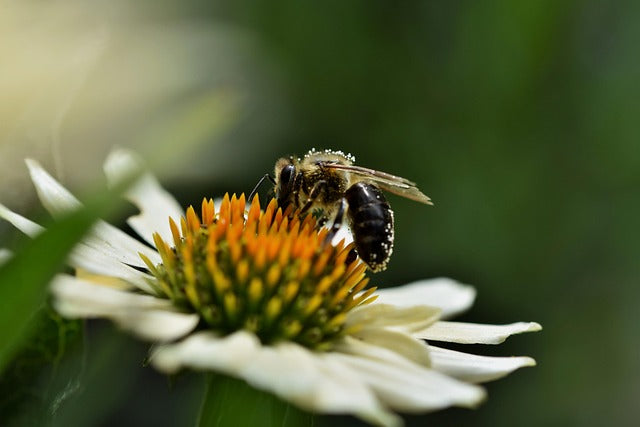
Exploring the Sweet World of Honey: A Beekeeper's Perspective
Share
Honey, the golden elixir of nature, has captivated the hearts and taste buds of humans for centuries. As a beekeeper, I've had the privilege of witnessing the intricate dance of these remarkable insects and the incredible process that transforms nectar into the sweet, nourishing substance we all know and love. In this blog post, I invite you to join me on a journey through the fascinating world of honey, where the delicate balance of nature and the hard work of bees come together to create something truly extraordinary.
The Hive: A Microcosm of Harmony
Step into the world of a beehive, and you'll be transported into a bustling, highly organized community. Each bee has a specific role to play, from the queen, who is responsible for laying eggs, to the worker bees, who tirelessly collect nectar, build the comb, and care for the young. The hive operates with a level of efficiency and cooperation that is truly awe-inspiring.
As a beekeeper, I've had the opportunity to observe the inner workings of the hive up close. I'm constantly amazed by the intricate communication system that the bees employ, using a combination of pheromones, dances, and vibrations to coordinate their activities. It's a true testament to the power of collaboration and the incredible capabilities of these tiny creatures.
The Nectar Gathering Expedition
One of the most fascinating aspects of beekeeping is witnessing the bees' foraging expeditions. As the weather warms and the flowers bloom, the worker bees embark on a quest to gather the sweet nectar that will become the foundation of their honey production.
Equipped with a long, slender proboscis, the bees delicately extract the nectar from the flowers, carefully storing it in their honey stomachs. These foragers can travel up to several miles from the hive, navigating the landscape with remarkable precision, guided by their keen senses and the sun's position in the sky.
The bees' ability to identify and remember the location of the most productive flower sources is truly remarkable. They communicate this information to their hive mates through a series of intricate dances, allowing the colony to efficiently exploit the available resources and maximize their honey production.
The Alchemy of Honey
Once the nectar has been collected, the real magic begins. Inside the hive, the bees work tirelessly to transform the nectar into the golden liquid we know as honey. This process is a true testament to the bees' incredible engineering and processing capabilities.
The bees first deposit the nectar into the honeycomb cells, where they use their wings to fan and evaporate the excess water content. As the nectar thickens, the bees add enzymes that break down the complex sugars into simpler, more easily digestible forms. This process not only enhances the flavor but also increases the honey's shelf life and antimicrobial properties.
Once the honey has reached the desired consistency, the bees seal the cells with a thin layer of beeswax, creating an airtight environment that preserves the honey's freshness and quality. This remarkable feat of natural preservation is a testament to the bees' innate understanding of their environment and the needs of their colony.
The Sweetness of Diversity
One of the most fascinating aspects of honey is the incredible diversity of flavors and aromas that can be found across different regions and floral sources. Each type of honey has its own unique characteristics, reflecting the unique blend of nectar that the bees have collected.
From the delicate, floral notes of clover honey to the rich, robust flavors of buckwheat honey, the world of honey is a true sensory delight. As a beekeeper, I've had the privilege of tasting honey from a wide range of sources, and I'm constantly amazed by the subtle nuances and complexities that can be found in each variety.
The Importance of Bees and Honey
Beyond the sheer pleasure of enjoying honey's sweetness, it's important to recognize the vital role that bees and honey play in our ecosystem. Bees are essential pollinators, responsible for the reproduction of a vast array of plant species, including many of the fruits and vegetables that we rely on for sustenance.
Without the tireless work of bees, our food supply would be severely compromised. Honey, in turn, serves as a valuable food source for both humans and other animals, providing a rich source of carbohydrates, vitamins, and minerals.
Moreover, honey has long been recognized for its medicinal properties, with a wide range of applications in traditional and modern medicine. From its use as a natural cough suppressant to its antimicrobial and wound-healing properties, honey has proven to be a versatile and valuable natural resource.
The Joys of Beekeeping
As a beekeeper, I've had the privilege of witnessing the incredible journey of honey production firsthand. It's a deeply rewarding experience to work in harmony with these remarkable creatures, to observe their intricate behaviors, and to be a part of the process that brings such a delightful and nourishing product to the world.
Beekeeping is not without its challenges, of course. From the ever-present threat of pests and diseases to the unpredictable nature of the weather, there are many factors that can impact the health and productivity of a hive. But for me, the rewards far outweigh the difficulties.
The joy of seeing a healthy, thriving hive, the satisfaction of harvesting a bountiful crop of honey, and the knowledge that I'm playing a small but vital role in sustaining our ecosystem – these are the things that make beekeeping such a fulfilling and meaningful pursuit.
Conclusion
As you've seen, the world of honey is a rich and fascinating one, filled with the wonders of nature and the incredible ingenuity of the humble honeybee. Whether you're a seasoned honey enthusiast or just discovering the joys of this golden elixir, I hope that this blog post has inspired you to appreciate the complexity and importance of these remarkable creatures and the sweet bounty they provide.
So the next time you savor a spoonful of honey, take a moment to reflect on the incredible journey it has taken to reach your table. And remember, by supporting local beekeepers and choosing sustainably produced honey, you're not only nourishing your body but also playing a vital role in preserving the delicate balance of our natural world.
